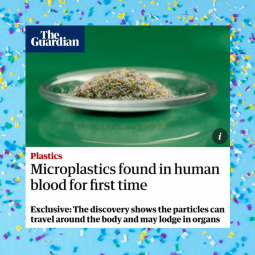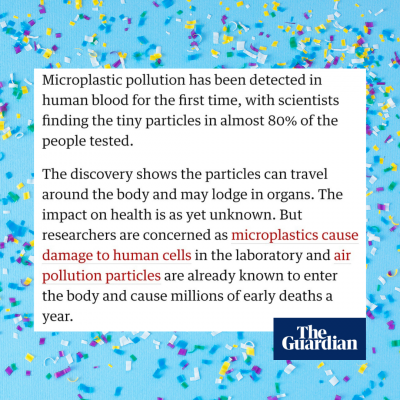Microplastics found in human blood for first time!
Microplastic pollution has been detected in human blood for the first time, with scientists finding the tiny particles in almost 80% of the people tested. The discovery shows the particles can travel around the body and may lodge in organs. The impact on health is as yet unknown. But researchers are concerned as microplastics cause damage to human cells in the laboratory and air pollution particles are already known to enter the body and cause millions of early deaths a year.
Huge amounts of plastic waste are dumped in the environment and microplastics now contaminate the entire planet, from the summit of Mount Everest to the deepest oceans.
Many studies indicate that plastic microparticles of plastic are present in food. Recently the scientific papers reported that microplastics had been detected in human blood. The MARE Foundation warns that plastic and microplastics are not only a threat to the environment, but also a real threat for humans.
In recent years, the potential impact of microplastics on human health is a hot issue. By consuming certain products we are exposed to the intake of large amounts of microplastics into our digestive system. Microplastics are found in bottled water, beer, salt, seafood, tea brewed in bags, or in ready-made meals packed in plastic. People were already known to consume the tiny particles via food and water as well as breathing them in, and they have been found in the faeces of babies and adults. Mass production of plastics has been growing steadily since 1950s and their wide use results from low production costs. Plastic is present in almost every sphere of our life. Carelessness in the use of plastics, especially single-use plastic items, has had an increasing impact on our planet.
The average person eats at least 50,000 microplastic particles a year and inhales a similar amount of them. However, the information from recent weeks is shocking - Dutch scientists have for the first time observed the presence of microplastics also in the blood of people. It is not yet known what consequences this may have for our health. The scientists analysed blood samples from 22 anonymous donors, all healthy adults and found plastic particles in 17. Half the samples contained PET plastic, which is commonly used in plastic bottles, while a third contained polystyrene, used for packaging food and other products. A quarter of the blood samples contained polyethylene, from which plastic carrier bags are made.
Global plastic consumption has now reached more than 320 million tonnes per year. Only 9% of them are recycled, which means that huge amounts of plastic end up in landfills or, worse, directly in the environment. According to the European Commission, between 4.8 and 12.7 million tonnes of plastic litter end up in the seas and oceans every year, with around 50% being single-use plastics. Most of this litter, unless removed, will remain in the marine environment forever, breaking down into increasingly smaller and more difficult to remove particles – microplastics, or even nanoplastics. Part of it is swallowed by animals as food, impairing the feeling of hunger and thus causing their death from starvation.
The problem of plastic pollution is also present in the Baltic. It is estimated that approximately 60% of marine litter in the Baltic and on its coast is plastic of different kind. Therefore, the MARE Foundation has been actively acting to improve the state of the Baltic ecosystem by taking different initiatives - said Olga Sarna, the Chair of the MARE Foundation. Together with fishermen’s organisations we remove the derelict fishing gears, the so-called ghost nets from the Baltic, we clean the beaches and the sea together with divers, and thanks to the annual campaign, offering the possibility to offer 1% of the taxes to public-benefit organisations, we installed 5 sea bins, which remove litter from marinas and ports. In 2022, the Foundation plans to purchase more such bins – added Sarna from the MARE Foundation.
The MARE Foundation has been working for the benefit of the Baltic Sea for years. It is the only non-governmental organisation in Poland focusing on the protection of marine ecosystems, with particular emphasis on the protection of the Baltic. Its main activities include the marine litter (ghost nets, plastic) hazardous wrecks and education.
To support the MARE Foundation in protecting the Baltic, you can donate money to our account. Follow the LINK



